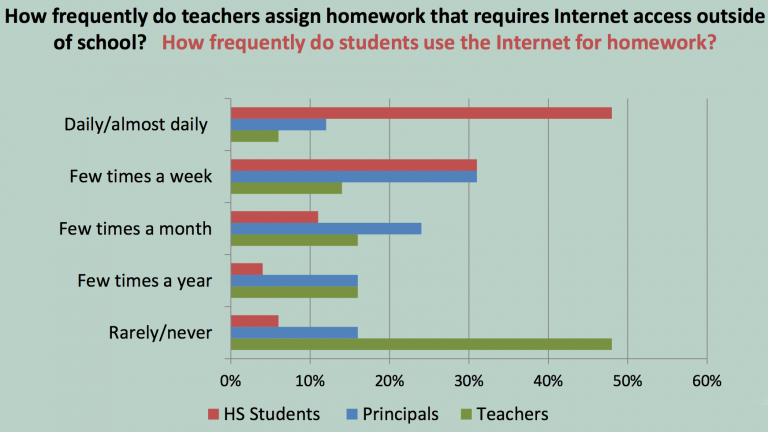High School Students and Teachers Don’t See Eye to Eye on Tech Use After School
When it comes to assigning students homework, teachers should know exactly what tools are required to complete it, right? Well, a recent survey shows that might not always be the case.
The latest Speak Up Research Project for Digital Learning survey of 514,000 students, educators and parents found that nearly half of high school students say their teachers are assigning homework that requires internet access daily, but less than 10 percent of teachers say they do.
“Students, teachers and administrators all have a different view on the role of internet access outside of school,” the report states. “Few teachers say they regularly assign Internet-dependent homework, more principals think Internet-dependent homework is being assigned, but students say they regularly use the Internet to help with homework.”
EdSurge reports that this discrepancy exists likely because students are using the internet to assist with their homework when teachers aren’t expecting them to.

SOURCE: "Speak Up 7 for 2017: Top digital learning trends in K-12 schools today," Project Tomorrow
Homework Gap Could Hinder Performance
With nearly half of students indicating that their homework requires internet access, this could spell trouble for students without reliable internet connectivity at home. Millions of students — largely those in low-income or rural areas — don’t have access to high-speed internet at home.
“Digital equity means breaking barriers and creating a level playing field regardless of economic status, so that all students have the technology they need available at school and at home,” says Socorro Independent School District superintendent José Espinoza in an interview with EdTech.
Espinoza says that SISD works with parents and the community to be sure everyone is informed about the district’s technology initiatives and on board to help make sure students have the access they need.
Students Need Tech Skills to Be Future-Ready
Though low-income students are more likely to be in the homework gap, overwhelmingly, 80 percent of low-income parents indicate that they believe technology could improve their children’s education.
The Speak Up research also indicates that students, parents and administrators agree that using technology as part of education is critical to students’ futures.
The students surveyed say they are quite aware that knowing how to use technology effectively is an important part of their future, but their school environment is inhibiting their tech use. Parents seem to agree about the importance of their children developing tech skills, but say that teachers aren’t consistently using tech.
The administrators that were surveyed say motivating educators to use technology is the biggest barrier they are facing to more widespread tech adoption.
Outside of motivation, Education Week’s annual Technology Counts survey finds that teacher training on how to integrate technology in the classroom is severally lacking.
For fourth-grade teachers alone, the number of educators who have received tech integration training has remained stagnant since 2009. This number is even lower for low-income schools.
“There’s widespread agreement that teachers aren’t coming out of college well-prepared to navigate this new digital environment,” says Education Week’s Benjamin Herold in a press release. “And for teachers already in the workforce, professional development hasn’t kept up with the pace of technological change.”









